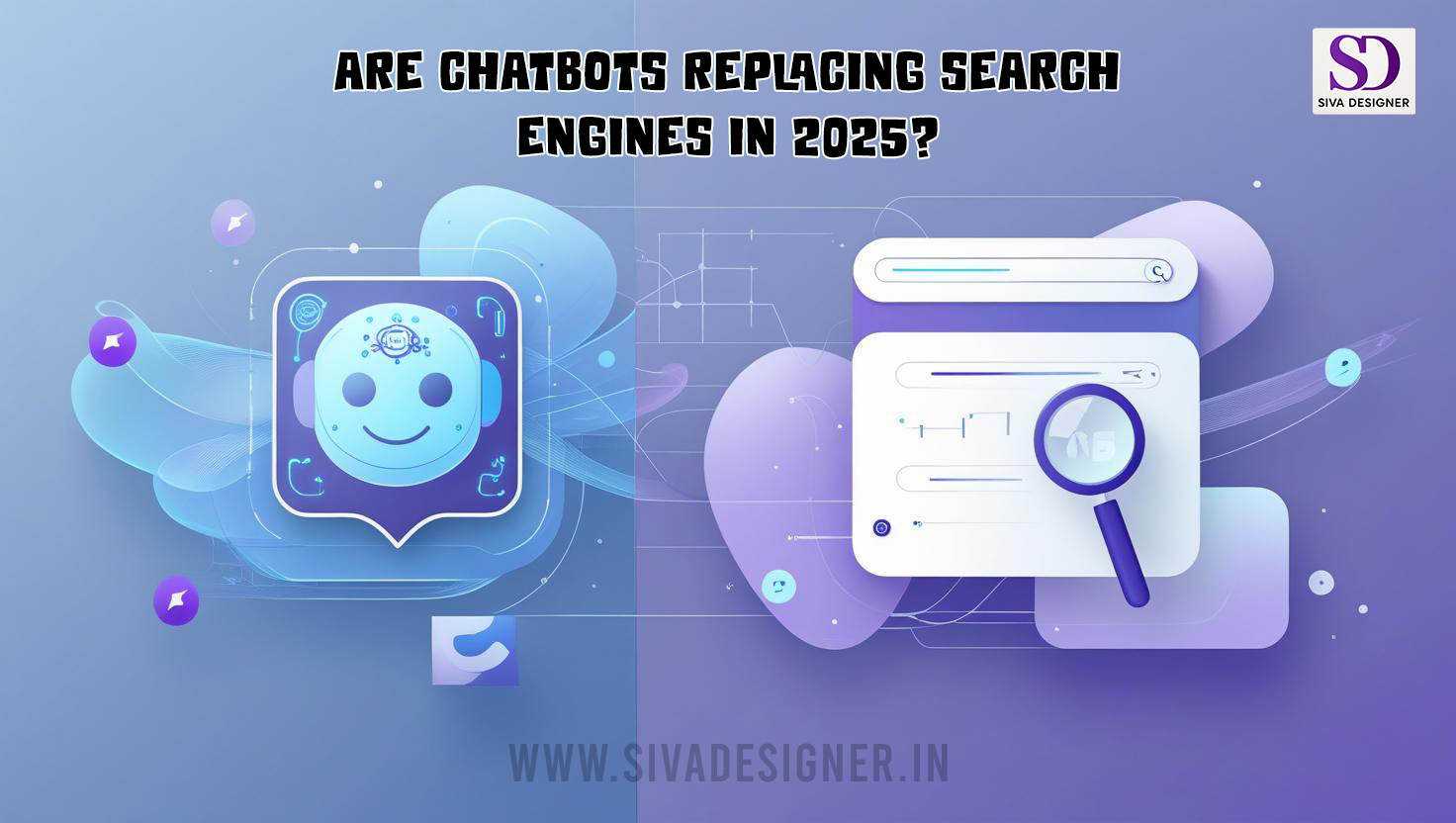AI Summary
Are AI chatbots replacing search engines in 2025? Get real data & trends on AI's impact on search, user behavior & how to adapt your SEO strategy.
Introduction to the AI Search Revolution
From Google to Generative AI: The Evolution of Search
For over two decades, search engines like Google and Bing have shaped how we explore the web. We've been trained to type in keywords, click links, and dig through pages of results.
But since 2022, the rise of AI chatbots like ChatGPT, Claude, Gemini, and Perplexity has started changing this pattern. Instead of asking “best restaurants in town” and skimming through 10 blogs, people now ask a chatbot - and get a direct answer in seconds.
Search is shifting. We're moving from keyword-based querying to natural, conversational interaction. It responds more quickly, seems more intelligent, and above all, offers a surprisingly natural, human-like experience.
Rise of Conversational Interfaces and User Expectations
We're no longer satisfied with a list of links. We want answers. We want clarity. Chatbots deliver on that - often in a tone that feels like you're chatting with a smart friend.
People love how natural it feels. No awkward phrasing, no keyword stuffing - just normal questions and helpful answers.
Why Users Are Shifting to Chatbots
Instant Answers Over Blue Links
When you're in a hurry, speed matters. Chatbots save time by delivering precise summaries instead of sending you off on a hunt through 10 web pages.
Studies from 2024 show that nearly 63% of users prefer direct answers over clicking through multiple sites. It's convenience over clicks - and chatbots win that race.
Chatbots Feel More “Human”
Natural language processing (NLP) has come a long way. Today's chatbots can hold conversations, adjust tone, and even express empathy.
They're not just tools. They're becoming assistants, companions, and in some cases, creative partners.
Contextual Replies Are a Game-Changer
Ask a chatbot three related questions, and it remembers what you're talking about. No need to rephrase or repeat.
Want to know the best cameras under $500? Then follow up with “Which one is best for video?” - the chatbot knows you're still talking cameras.
Try that in a search engine, and you'll probably start a whole new session.
What the Data Says (2024 - 2025)
Trends in Traditional Search Queries
Even as AI becomes more popular, classic search engines are adapting and changing rather than disappearing.
Global data shows only a 0.51% year-over-year decline in total search engine traffic, which still clocks in at a staggering 1.86 trillion visits annually.
Google and Bing remain dominant forces, especially after integrating AI-powered features like Gemini and Copilot.
Growth of AI-Assisted Searches
AI chatbot platforms, however, are growing fast. In 2024 alone, AI-assisted searches grew by 80.92%, reaching 55.2 billion visits globally.
Still, that's just around 3% of total search traffic. So while chatbots are growing quickly, traditional search still holds the crown.
Google vs. ChatGPT in 2025: Who's Leading the Search Game?
Here's how they compare:
- Google: 5.5 billion daily visits
- ChatGPT: 233 million daily visits
- ChatGPT dominates 86% of chatbot traffic, with Gemini, Claude, and Perplexity making steady gains.
To sum it up: while chatbots are growing rapidly, search engines continue to dominate in terms of overall usage.
Google: The Giant Still Standing
Even with all the AI hype, Google still sees over 5.5 billion searches a day. Why?
- It's deeply integrated into browsers, phones, and apps.
- It still offers unmatched real-time info and diverse sources.
- People trust it for authoritative, verified content.
But even Google knows change is coming. That's why it launched Gemini, its answer to ChatGPT, and SGE, which adds summaries at the top of search results.
ChatGPT: The Fastest Growing AI Tool
ChatGPT's growth is insane:
- 233+ million daily visits
- Dominates 86% of chatbot market share
- Integrated into tools like Microsoft Word, Slack, and mobile apps
It's no longer just a “curiosity” - it's part of people's daily workflow. People use it for writing emails, creating content, solving coding bugs, and even relationship advice.
Other Rising Platforms:
- Perplexity.ai: Gaining fans for showing sources while summarizing content.
- Claude (Anthropic): Loved for longer memory and smoother tone.
- Gemini (Google): New, but rapidly evolving with direct integration into Android.
Users are exploring these alternatives depending on what they want: accuracy, longer conversations, or privacy.
Chatbots vs Search Engines: Side-by-Side Comparison
Depth of Information
- Search engines pull from a wide array of sources, offering depth and variety.
- Chatbots offer short, synthesized summaries. Great for clarity, but sometimes too brief for deep dives.
Accuracy and Reliability
- Search engines direct users to credible sources (though it's still up to the user to choose wisely).
- Chatbots generate responses from trained data, which means there's room for errors or outdated facts.
Speed and Convenience
- Chatbots give you what you want fast - one paragraph, one response.
- When you want to browse a variety of sources or see multiple viewpoints, search engines are still the go-to option.
User Experience Differences
- Chatbots = Interactive, friendly, human-like.
- Search engines = Informational, open-ended, often link-heavy.
Google's new SGE (Search Generative Experience) aims to combine both styles - instant answers plus a link trail.
Use Cases Where Chatbots Excel
Daily Queries: “How to”, “What is”, “Best tools”
Need a quick tutorial? Want a product suggestion? Chatbots answer instantly and clearly.
Academic Help and Research
From summarizing journal articles to explaining tough concepts, chatbots are becoming essential study buddies.
Writing, Coding, and Planning Tasks
They're also great for:
- Writing content drafts
- Debugging code
- Brainstorming ideas
- Outlining strategies
It's like having a creative partner on demand.
Use Cases Where Search Engines Remain Essential
Local Services and Maps
Looking for the closest dentist or 24/7 store? Nothing beats Google Maps.
Real-time News and Fresh Results
For breaking news or trending stories, search engines (especially Google News) still provide the most up-to-date content.
Shopping and Product Comparison
Looking to check product details, pricing, and customer feedback from several retailers at once? Search engines win for e-commerce research.
How Google and Microsoft are Responding
Google's Gemini and Search Generative Experience (SGE)
Google's Gemini is now deeply integrated into search. It provides conversational responses alongside traditional links, giving users the best of both worlds.
SGE has been launched in over 100 countries and continues to expand.
Microsoft's Copilot Integration with Bing
Bing is no longer just a search engine. It's now powered by Copilot, offering:
- Conversational replies
- Visual and text-based results
- Better productivity across apps
Microsoft is betting big on AI - and it's working.
The Role of Voice Search and Smart Assistants
Chatbots in Alexa, Siri, and Google Assistant
Voice assistants now use chatbot tech behind the scenes. Ask Siri a complex question, and it's likely powered by a chatbot-like model.
Rise of Voice + Text Hybrid Search
Users now start searches by voice and continue with text, or vice versa. It's a smooth, flexible experience that blends the best of both worlds.
SEO in the Age of AI
How Marketers Are Adapting
Marketers are now optimizing content not just for Google, but also for AI summarization. That means writing clearly, answering questions directly, and offering real value.
Marketers are now writing for two audiences:
- Humans reading the page
- AI bots summarizing the page
This means:
- Begin your content with concise, straightforward answers to address user questions right away.
- Structured headings (H2s, H3s) that bots can identify
- Content that answers questions directly
For example, instead of burying the answer in paragraph 4, you start with:
“The best free AI tools in 2025 are…”
Then explain why, with bullet points.
Shifting from Keywords to Conversations
Instead of stuffing keywords like “best AI tools 2025,” they now aim to answer questions like “What AI tools should I use to grow my blog?”
People now type or speak like they think:
- Old search: “SEO tools 2025 free”
- New search: “What are the best free SEO tools I can use this year?”
That means content must feel natural and helpful, not robotic.
Importance of Authoritative, Crawlable Content
Search engines and AI bots still rely on clean, crawlable websites with high authority. Solid SEO fundamentals still matter.
Even in an AI world, if your site:
- Has poor structure
- Doesn't load fast
- Isn't mobile-optimized
Then neither Google nor chatbots will use it.
Additionally, chatbots tend to source their responses from reputable websites that are well-structured and easy for algorithms to interpret. That's your golden ticket if you want your brand to be quoted by AI.
Should You Switch to Chatbots for Everything?
When to Use Search Engines
- Finding real-time info
- Researching local businesses
- Comparing reviews and prices
When Chatbots Work Better
- Quick answers
- Planning and writing tasks
- Asking complex or multi-step questions
The best approach? Use both. Recognize which situations call for a traditional search and when it's more efficient to use a chatbot.
Future Predictions (2025 - 2030)
Let's go deeper into what the next 5 years might look like.
Is Search Going Away?
No. But it's evolving - fast. The distinction between chatbots and search engines is becoming less clear as their features increasingly overlap.
By 2030:
- You might not “search” at all.
- You'll have a personal AI agent that knows your preferences.
- It'll scan the web, summarize it, and recommend the best answer.
- It won't just pull from the internet - it will analyze it for you.
Merging of Chat + Search Interfaces
Expect more hybrid tools that let you chat, search, and explore - all in one place. That's where search is headed.
Already happening:
- Google SGE gives AI answers before search results.
- Bing Copilot blends links, charts, code, and visuals.
- You.com offers multi-panel search with AI summaries, videos, and products.
What we'll likely see next:
- Unified chat/search windows
- Personalized dashboards
- Ad models that work inside chat (without being intrusive)
Bottom line: You'll still "search," but instead of hunting for information - you'll have conversations with it.
Summary: What It Means for You
Chatbots aren't replacing search engines yet - but they are transforming them.
You'll still use Google and Bing, but in a smarter, faster, more conversational way. AI chatbots are changing how we find information - and that means you need to change how you create, search, and optimize your content.
Let's recap this shift and what it means in real life:
If You're a User:
- Use Google for news, maps, and anything local or product-related.
- Use chatbots when you need explanations, summaries, ideas, or writing help.
- Combine both for best results.
If You're a Business:
- Write content that answers questions directly
- Optimize your site for AI and human readers
- Monitor where your content is being quoted (you might already be in ChatGPT's training data)
If You're a Marketer or Creator:
- Focus on topic authority, not just keywords
- Think in questions and answers
- Make sure your content loads quickly, is well-organized, and communicates ideas in a straightforward way.
Conclusion
AI isn't killing search - it's upgrading it.
Chatbots like ChatGPT, Gemini, and Copilot are pushing the limits of what we thought “search” could be. They're more than tools. They're partners in our daily information hunt.
In 2025 and beyond, we won't stop searching - we'll just search differently.




0 Comment(s)
Be the first to leave a comment!